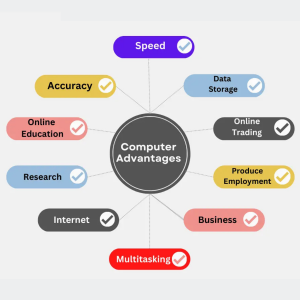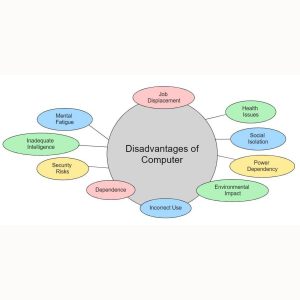In the modern-day digital age, computer systems have become an inseparable part of human life. Whether in our houses, workplaces, schools, or maybe pockets (within the shape of smartphones), computer systems effect almost each aspect of our day by day lives. From communique and schooling to healthcare and amusement, computer systems have revolutionized how we engage with the sector. While their blessings are severa, it’s far equally critical to consider their drawbacks. This article offers a complete and distinctive examination of the blessings and downsides of computer systems.
What is a Computer?
A computer is an electronic tool able to processing, storing, and retrieving facts. It operates the use of a aggregate of hardware (the bodily additives) and software program (the commands or packages). With their unequalled pace, accuracy, and versatility, computer systems are used across industries for various functions.
From primary calculators to advanced artificial intelligence structures, computers have evolved significantly. They now serve no longer simplest as gear for acting obligations however additionally as platforms for innovation, leisure, and education.
Advantages of Computers

1.Increased Efficiency and Productivity
One of the biggest advantages of computers is their capability to increase productivity. Tasks that when took hours or maybe days can now be completed in minutes. For example:
- Businesses use enterprise software to manage inventory, payroll, and customer relationships.
- Manufacturers use automation systems powered by computers for precision and speed.
- Writers and designers can use editing software to quickly revise and finalize projects.
Computers allow multitasking and reduce the want for human attempt in repetitive responsibilities, thereby enhancing standard performance.
2.High Speed and Accuracy
Computers can carry out tens of millions of commands in line with second without errors. They system information quicker than any human may want to, making them integral in:
- Scientific research
- Weather forecasting
- Financial trading
The accuracy of computer systems is some other advantage. When properly programmed, they can carry out complex calculations without mistakes, making them reliable equipment in fields that demand precision.
3.Massive Storage Capability
Modern computer systems and cloud offerings allow the storage of big quantities of facts. A single difficult drive can shop hundreds of files, photographs, movies, and packages. Cloud computing expands this capability by way of providing faraway access and backup options. As an end result:
- Businesses can maintain years of data records.
- Students can store all learning resources in one device.
- Photographers and content creators can archive high-resolution media.
4.Improved Communication
Communication is quicker and easier than ever, way to computer systems and the internet. Emails, video calls, on the spot messaging, and social media platforms are all laptop-pushed innovations. This has transformed:
- Remote work and collaboration
- Global business operations
- Education and virtual learning environments
5.Access to Information and Knowledge
Search engines like Google and on-line systems like Wikipedia, YouTube, and educational web sites provide substantial knowledge on each attainable topic. Computers have democratized get entry to to training and information:
- Students can learn online from prestigious institutions.
- Self-learners can pick up new skills like coding or graphic design.
- Researchers can access global databases and journals.
6.Educational Advancements
The function of computer systems in training is sizable. Virtual school rooms, e-books, simulations, and studying management structures decorate the mastering enjoy:
- Interactive software engages students better.
- Special education tools assist children with disabilities.
- Teachers can deliver content in visually engaging ways.
7.Entertainment and Multimedia
Computers serve as entertainment hubs:
- Streaming movies and music
- Online gaming
- Virtual and augmented reality
- Graphic design and video editing
Creative professionals depend on computers to produce, edit, and distribute content globally.
8.Automation and Artificial Intelligence
Computers drive automation and artificial intelligence (AI), leading to smart systems in:
- Manufacturing (robotics)
- Healthcare (AI-based diagnostics)
- Retail (chatbots and recommendation engines)
- Transportation (self-driving cars)
These technologies improve efficiency, reduce costs, and enhance customer experiences.
9.Data Analysis and Decision-Making
In the business and scientific worlds, data is key. Computers enable:
- Real-time data processing
- Predictive analytics
- Market trend forecasting
- Customer behavior analysis
This empowers organizations to make data-driven decisions.
10.Support for Healthcare
Computers play a critical role in modern medicine:
- Patient record management
- Diagnostic imaging (MRI, CT scans)
- Robotic surgeries
- Telemedicine
They enhance accuracy in diagnosis, improve patient outcomes, and expand healthcare accessibility.
Disadvantages of Computers

1.Health Risks and Sedentary Lifestyle
Extended pc use can reason:
- Eye stress and vision troubles (Computer Vision Syndrome)
- Poor posture and returned pain
- Carpal tunnel syndrome from repetitive typing
- Reduced physical hobby leading to weight problems
Proper ergonomics and display screen breaks are crucial to limit those risks.
2.Cybersecurity Threats
With improved connectivity comes vulnerability. Computers are goals for:
- Viruses and malware
- Data breaches
- Ransomware attacks
- Phishing scams
Without sturdy protection protocols, sensitive non-public and business data may be compromised.
3.Job Displacement and Unemployment
Automation powered by way of computers has caused process losses in various sectors:
- Manufacturing (robots replacing factory people)
- Customer provider (chatbots changing call facilities)
- Retail (self-checkout kiosks)
Though new tech jobs are being created, the transition can be tough for affected workers.
4.Digital Addiction and Mental Health Issues
Excessive computer use can lead to:
- Internet or gaming addiction
- Social withdrawal
- Anxiety and depression from social media comparisons
- Decreased attention span
Mental health professionals emphasize the importance of screen-time balance.
5.Loss of Privacy
With personal data being collected constantly, privacy is at risk. From social media to search history, much of our digital life is tracked. Issues include:
- Identity theft
- Unauthorized surveillance
- Exploitation by advertisers and data brokers
6.Social Isolation
While computer systems beautify communique, they will reduce real-existence interactions:
- Teens spending greater time on monitors than with family
- Virtual relationships changing face-to-face ones
This can result in emotional detachment and loneliness.
7.Digital Divide
Not each person has get entry to to computer systems and the net. This hole is called the digital divide, and it impacts:
- Rural and coffee-earnings groups
- Developing international locations
Lack of get admission to limits training, employment, and healthcare opportunities.
8.Environmental Impact
The production, utilization, and disposal of computer systems have ecological outcomes:
- E-waste incorporates toxic materials
- Energy consumption contributes to carbon emissions
- Short existence spans of gadgets increase waste
Recycling applications and inexperienced computing practices goal to mitigate those outcomes.
9.Overdependence on Technology
Excessive reliance on computers can reduce human abilities in:
- Mental arithmetic (due to calculators)
- Memory retention (due to cloud storage)
- Critical thinking (due to search engines doing the work)
We risk losing problem-solving and analytical skills.
10.Software and Hardware Failures
Computers aren’t infallible. Common issues consist of:
- System crashes
- Data loss
- Software bugs
- Hardware malfunctions
Such troubles can disrupt enterprise operations or result in loss of critical information.
Tips for Responsible Use of Computers
- Follow the 20-20-20 rule to prevent eye strain.
- Use antivirus and replace software often.
- Take regular breaks and stretch.
- Use sturdy passwords and two-component authentication.
- Be careful at the same time as sharing non-public statistics online.
Future Trends in Computing
- Quantum Computing
Poised to revolutionize fields like cryptography and drug discovery with extreme processing power.
- Cloud and Edge Computing
Bringing faster services and scalability in applications like IoT and AI.
- Green Computing
Reducing environmental impact through energy-efficient hardware and e-waste recycling.
- AI-Powered Automation
From chatbots to self-driving cars, AI will redefine convenience and efficiency.
Conclusion
Computers have surely transformed the arena in amazing ways. They beautify productivity, allow worldwide communication, help education, and stress innovation in each area. From simplifying ordinary responsibilities to solving complicated worldwide problems, their blessings are some distance-undertaking.
However, the drawbacks can’t be unnoticed. Health risks, cybersecurity threats, job losses, and environmental worries are actual and urgent troubles. As society maintains to combine pc structures more deeply into everyday lifestyles, a balanced and accountable approach is important.
Having an information of the professionals and cons of computer systems permits individuals, governments, and establishments to make well-informed selections. The secret is within the right use, digital literacy, and accepted get admission to so that the power of the pc reaches absolutely everyone, and no one is left behind.


Be the first to comment on "Advantages and Disadvantages of Computer"